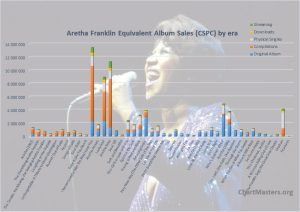Forum
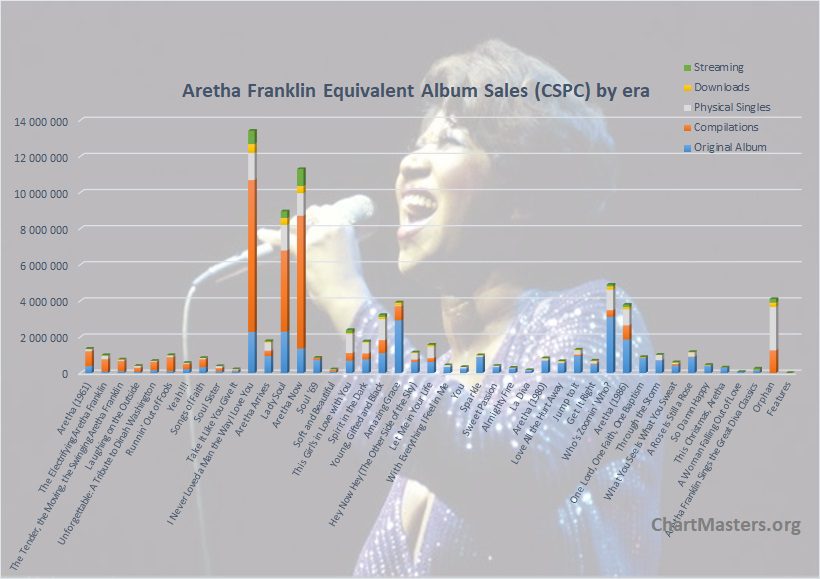
More than 60 years after her debut, and 5 years after her passing, Aretha Franklin remains a flagship for many causes.
One of the first female superstars, through her memorable hits she has been the voice of both feminists, civil rights activists, anti-war protests, and of course the black community. Ultimately, her name became synonymous with social justice.
We will see if her success as a singer matches her overall impact, and how well her catalog is remembered to this day.
A few words about the artist
Born in March 25, 1942 in Memphis, Tennessee, American singer Aretha Franklin is widely regarded as the Queen of Soul.
She was only a teenager when she started touring churches to sing popular gospel songs. Her powerful voice quickly brought her attention, and a recording contract to release the religious hit Never Grow Old while aged 14 only.
From this point, it was a very slow climb to the top until the explosion. The industry was noticing her. She met with Sam Cooke, lived with Mavis Staples, and got to know Marvin Gaye who dated her sister.
At 18, Columbia, RCA and Motown fought to sign her, with Franklin choosing the former option. From 1961 to 1967, no less than 9 distinct studio albums came out for the major label, plus Songs of Faith in 1965, the first LP to home her earlier material.
While she established herself as a strong performer and got success with her tours, her records failed to make big wave on charts. Only 4 LPs made it into the Billboard Top 200, and none went higher than #69. On its side, her biggest single peaked at 37.
Her contract expired in late 1966 with the artist being in debt to the major. She signed with Atlantic in 1967, and the success came with it instantly.
By the end of 1968, she was up to 9 top 10 hits, 9 million selling singles stateside, and 4 albums with extensive runs inside the top 5.
This outstanding string of success was possible thanks to hits as strong as I Never Loved a Man the Way I Love You, Respect, Baby I Love You, (You Make Me Feel Like) A Natural Woman, Chain of Fools, Think, I Say a Little Prayer and more.
On paper, this unbelievable run ran out of gas quickly, as the singer would be able to reach the Top 10 album chart only one more time - in 1972 with her gospel album Amazing Grace - until her 2018 passing.
In truth, Billboard charts' methodology was unfavorable to black artists at the time, she kept releasing million selling hits in early 70s, and got an great revival in mid-80s, with last breathes from the 90s performing decently as well.
In the end, she had no less than 20 #1 hits on R&B charts, and entered the Hot 100 with 73 distinct songs despite the unfair treatment. It remained an all-time record for a female artist until the digital era.
Obviously, a body of work as impressive as this one brought her various accolades.
Her breakthrough prompted the Grammy Awards to create a Best Female R&B Vocal Performance category, and she took the award home 8 years in a row. Overall, she won 18 Grammys during her career.
Franklin was the first female to be inducted into the Rock and Roll Hall of Fame in 1987. She is ranked at #1 among the best singers of all time by Rolling Stone magazine.
While her prowess as a vocalist is famous, less people know that Franklin was also a first class pianist, taking care of this instrument herself on most of her tracks, and a huge songwritter, penning hit songs like Think, Since You've Been Gone, Rock Steady, Day Dreaming and Who's Zoomin' Who.
The Commensurate Sales to Popularity Concept (CSPC)
As usual, I'll be using the Commensurate Sales to Popularity Concept in order to relevantly gauge her results. This concept will not only bring you sales information for all Franklin's albums, physical and download singles, as well as audio and video streaming. In fact, it will also determine their true popularity.
If you are not yet familiar with the CSPC method, below is a nice and short video of explanations. I fully recommend watching it before getting into the sales figures. Of course, if you are a regular visitor feel free to skip the video and get into the numbers directly.
There are two ways to understand this revolutionary concept. In the first place, there is this Scribe video posted below. If you are unaware of the CSPC method, you will get the full idea within just a pair of minutes.
[adthrive-in-post-video-player video-id="qixxDCRj" upload-date="2023-11-08T15:43:50.000Z" name="Commensurate Sales to Popularity Analysis (CPSC) - Explanations.mp4" description="null" player-type="default" override-embed="default"]
If you are a mathematical person, and want to know the full method as well as formulas, you can read the full introduction article.
Now let's get into the artist's sales figures in detail in order to apply this concept and define the act's true popularity!
Aretha Franklin Album Sales

Updated Studio Album Sales & Comments
[wpdatatable id=30 var1=7nwUJBm0HE4ZxD3f5cy5ok]
All artists are formats more favorable than others due to their era and the way their catalog was managed. For Aretha Franklin, pure studio album sales aren't too good in general.
In fact, she did smash hard in tis format, there aren't many artists who can claim 4 top 5 albums in less than a year. But these albums came just before the explosion of LP sales.
By 1967/68, sales overseas were fairly low too, and by the end of these two years, both a live and a compilation were already hitting the market, destroying the interest in original studio albums.
That's why her two big classics from this period, I Never Loved a Man the Way I Love You and Lady Soul, stand at 2.3 million only.
As expected, the earlier albums sold very low numbers, even if both Aretha (1961) and Songs of Faith top 300,000 units thanks to countless reissues through various budget labels.
From 1967 to 1974, following the biggest albums, remaining ones are stable from 600,000 to 1.4 million sales a piece. That's far from being bad especially considering the heavy pace of release.
One album stood out of the pack, Amazing Grace. It did great upon release, and its distinct nature, with gospel recordings rather than crossover hits, made it immune to subsequent compilations, making it her strongest selling catalog title. It's closing in 3 million sales.
The second half of the 70s was really bad, with a slight brightening with the soundtrack Sparkle not too far away from a million sales.
The diva restored her ability to move at least half a million units per title when she moved to Arista from her 1980 album Aretha.
Surprisingly, she beat her career high in 1965 with Who's Zoomin' Who?, sustained by both Hot 100 top 10 hits Freeway of Love and the title track.
The latter song supported the album into the US top 20 for several months, with global sales exceeding 3 million. 1986's Aretha had its share of hits too, most notably the George Michael duet I Knew You Were Waiting For Me, moving nearly 2 million, while subsequent releases returned to the half a million units per era standard of the artist.
In total, these studio sets add for 30 million units, which reflects better the success of an artist who has been releasing albums as fast as Franklin.
Aretha Franklin songs sales
Below, we list down results from the artist through physical sales, digital sales and streaming.
Please be aware that when the artist is regarded as the lead act, he is rewarded with 100% of these units, while featured acts share among them a 50% piece of the totals.

Physical Singles
[wpdatatable id=27 var1=7nwUJBm0HE4ZxD3f5cy5ok]
As a reminder, the weighting is done with a 10 to 3 ratio between one album and one physical single.
It would be a tautology to say that Franklin's physical singles catalog is large. She charted 73 singles in the Hot 100, but 112 tracks overall on various Billboard charts, and once we add uncharted songs as well as overseas releases, we climb all the way up to 227 singles.
From 1967 to 1973, she released no less than 14 singles which moved over a million in the US, from I Never Loved A Man... to Until You Come Back To Me. The strongest of them all was Respect at 2 million sales. The House That Jack Built is close behind thanks to the b-side which ultimately overshadowed the a-side, I Say A Little Prayer.
Most of them sold poorly elsewhere, with figures ranging often from 100,000 to 200,000 units. Spanish Harlem was the biggest with 440,000 sales outside of the US, pushing it close to 2 million in total.
These were original releases though. Many of these songs got various reissues as well as distinct local versions elsewhere.
Respect flies to over 3.5 million units in total, and more singles move past 1 million total sales, like Natural Woman, The Weight, and of course the quartet of more international hits from the 80s, led by I Knew You Were Waiting For Me at over 2.1 million.
Career-wise, she cracks 51 million sales, which puts her ahead of names as big as Queen or Whitney Houston among the top physical singles sellers.

Digital Songs
[wpdatatable id=28 var1=7nwUJBm0HE4ZxD3f5cy5ok]
As a reminder, the weighting is done with a 10 to 1.5 ratio between one album and one digital single.
No need to say that the hey-days of Aretha Franklin were long gone when digital singles came in. She was nearly 50 years into her career when iTunes was deployed globally.
Her hits stood the test of time though. The leader is no other than Respect, with close to 2.5 million sales.
Both I Say A Little Prayer and Natural Woman complete a solid top 3, with about 1.5 million units each. Next up are Chain of Fools and Think at roughly 800,000 sales.
It's really a unique situation when an artist with a body of work as extensive as Franklin's one has her 5 strongest catalog titles released over a span of 15 months only.
On the contrary, the singer claims tracks with over 100,000 sales from 5 distinct decades. I Knew You Were Waiting (For Me) is once again the prime example of her 80s revival, but songs like Rock Steady, Until You Come Back to Me and Freeway of Love also provide a good consistency to her discography.
Million selling singles back in the day who got forgotten through the years include See Saw, The House That Jack Built and Spanish Harlem.
The total of her catalog is a sizable 17.5 million downloads and ringtones sold to date.

Streaming
Streaming is made up of audio and video streams. Our CSPC methodology includes both to better reflect the real popularity of each track.
The main source of data for each avenue is respectively Spotify and YouTube. To factor in the growing impact of multiple Asian countries where these platforms aren't always the go-to site for music streaming, more sources have been added.
In order to account for their real popularity in each relevant country, the below sources have been used along with the mentioned ratios that reflect the market share of each area.
Audio Streams
– South Korea: Genie streams * 2.20 (consistent with Gaon streaming numbers)
– Japan: AWA streams * 100 / 4 (AWA has 4% of the Japanese streaming market)
– Arabic world: Anghami streams
– Sub-Saharan Africa: Boomplay + Audiomack streams
– Elsewhere: Spotify streams * Spotify market shares based on artists' market distribution
Video Streams
– China* : QQ video streams * 50 if the song is available for audio stream, QQ video streams * 5 elseway (scale built based on known figures for several major artists)
– Elsewhere : Youtube views increased by 10% to account for various local platforms
*since Chinese streaming platforms are mostly video streaming platforms, their streams are weighted on par with YouTube streams.
Audio Stream value – 1,500 plays equal 1 album unit
Video Stream value – 6,750 views equal 1 album unit
Equivalent Albums Sales (EAS) = ( Spotify * ArtistRatio + Genie * 2.20 + AWA * 100 / 4 + Anghami + Boomplay + Audiomack ) / 1500 + ( QQ views* 50(or 5) + YouTube * 1.1 ) / 6750
Top Hits
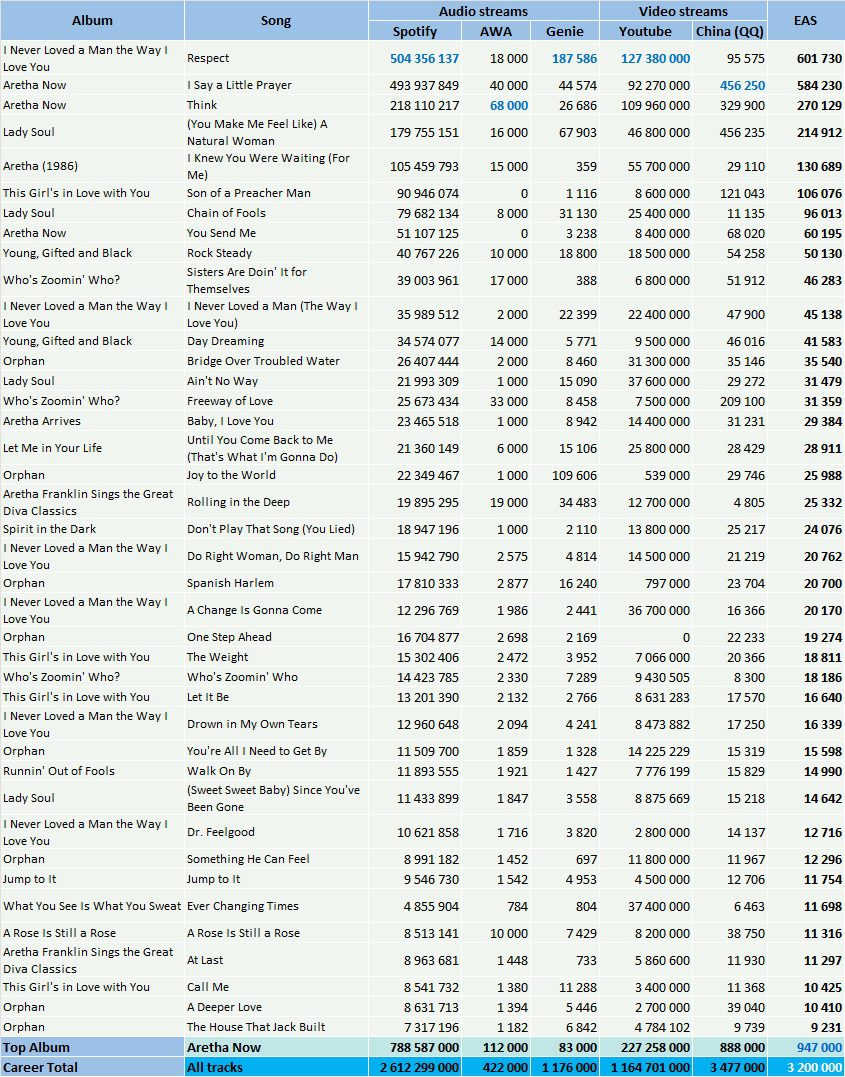
Once again, as with physical and digital sales, Respect is on the lead. It does so with a minimal margin though, with I Say a Little Prayer hot on its wheels.
Both tracks are among the 30 most streamed tracks from the 60s on Spotify, and quite simply the #1 and #2 among female songs.
With roughly half a billion streams each, they are both huge standards, even if the lack of proper music video diminish their impact on YouTube.
Full catalog breakdown
If you are familiar with the artist's catalog and want to check details of each and every song, you can access to all of them right here.
Keep yourself up to date
Our website provides you a fantastic tool which fetches updated Spotify streams as you request them, use it to watch these results grow day after day!
Aretha Franklin compilations sales
It sounds fairly logical to add together weighted sales of one era - studio album, physical singles, downloads, streams - to get the full picture of an album's popularity. For older releases though, they also generate sales of various live, music videos and compilation albums.
All those packaging-only records do not create value, they exploit the value originating from the parent studio album of each of its tracks instead. Inevitably, when such compilations are issued, this downgrades catalog sales of the original LP.
Thus, to perfectly gauge the worth of these releases, we need to re-assign sales proportionally to its contribution of all the compilations which feature its songs. The following table explains this method.
The distribution process

How to understand this table? In the example of Aretha's Greatest Hits, these figures mean it sold 2,265,000 units worldwide. The second statistics column means all versions of all the songs included on this package add for 1,684,562 equivalent album sales from streams of all types.
The second part on the right of the table shows how many equivalent streams are coming from each original album, plus the share it represents on the overall package.
Thus, streaming figures tell us songs from the Aretha Now album are responsible for 34% of Aretha's Greatest Hits track list attractiveness. This means it generated 768,000 of its 2,265,000 album sales and so forth for the other records. We then apply this process to all compilations present on the table.
Compilations sales figures listing
[wpdatatable id=29 var1=7nwUJBm0HE4ZxD3f5cy5ok]
Full Length related records Sales – Summary
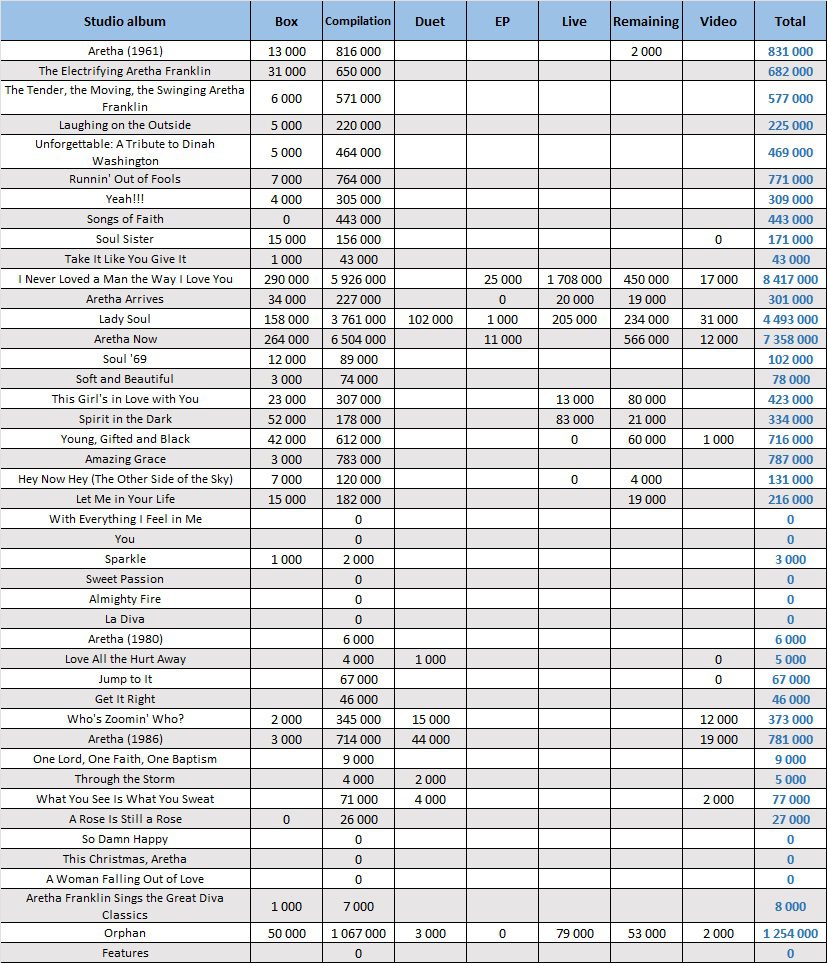
Here is the most underestimated indicator of an album’s success - the amount of compilation sales of all kinds it generated. Due to the dependency of sales of the original studio albums on these releases, they are a key piece of the jigsaw.
These numbers are obtained by applying the method from the section The distribution process to all packages listed under Compilation sales figures listing category.
Popular songs from the golden 1967-68 years have been milked to death for many years, with countless compilations and live sets exploiting them.
The result is big, with I Never Loved a Man the Way I Love You fueling more than 8 million of these sales, more than 7 million for Aretha Now and more than 4 million for Lady Soul.
Total Album (all types) Sales per Country
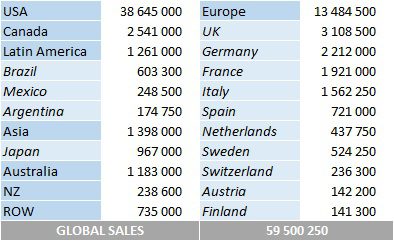
Please note country-specific numbers may miss sales of a few minor releases, although totals are complete.
Aretha Franklin Career CSPC Results

So, after checking all the figures, how many overall equivalent album sales has each album by Aretha Franklin achieved? Well, at this point we hardly need to add up all of the figures defined in this article!
Albums CSPC results
[xyz-ips snippet="updatedCSPCalbums"]
I Never Loved a Man the Way I Love You closes counts on over 13 million equivalent album sales, a pair of millions ahead of Aretha Now, itself a pair of millions ahead of Lady Soul.
These are very impressive numbers when you drop an album every 6 months. Her output from these 1967-68 years are responsible for over 35 million sales, a tally that puts her among the very biggest names from this period and miles ahead of any other female singer.
There are also 4 albums in the 3-4 million range, Young, Gifted and Black and Amazing Grace from the early 70s, and Who's Zoomin' Who? and Aretha (1986) from the mid 80s.
In total, 16 albums spread over 37 years are over a million, with 3 more poised to get there in the future.
Of course, not everything is too valuable on her catalog, but the career total of over 81 million is very big still.
Singles CSPC results
The list is compiled in album equivalent sales generated by each song. Therefore, these figures are not merged units of singles formats. Instead, it includes weighted sales of the song's physical single, download, ringtone and streaming as well as its share among sales of all albums on which it is featured.
[wpdatatable id=48 var1=7nwUJBm0HE4ZxD3f5cy5ok]
Discography results
[xyz-ips snippet="ArtistASRstats"]
Records & Achievements
- At 504 million streams, Respect is the most streamed 60s female song on Spotify.
- At 494 million streams, I Say a Little Prayer is the 2nd most streamed 60s female song on Spotify.
- At 13,420,000 EAS, I Never Loved a Man the Way I Love You is among the 10 most successful albums from 1967.
- At 8,955,000 EAS, Lady Soul is among the 20 most successful albums from 1968.
- At 11,300,000 EAS, Aretha Now is among the 10 most successful albums from 1968.
NB: EAS means Equivalent Album Sales.
Dynamic Spotify Key Performance Indicators
Please note that numbers below are retrieved automatically, so they will evolve day by day unlike previously listed data which is valid as of the publication date of the article.
[xyz-ips snippet="ArtistRandomDetails"]
As usual, feel free to comment and / or ask a question!
Sources: IFPI, Spotify, YouTube, Discogs.
You may be interested in...
... Aretha Franklin's streaming masters analysis
... checking out the upcoming artists or even voting for them!
... best-selling artists, albums, and singles
We have created amazing cross-artists tops. Click to see all CSPC and raw sales results compiled so far!
... similar artists
80m and the highest selling album in traditional album sales is only at 3.2m is wild tbh
Isn’t true that most album sales weren’t tracked properly prior to systems like nielsen soundscan? I feel like aretha’s albums are quite low considering how huge she was in the late 60s and 70s
Different times, Elvis' best selling album sold 4.6m with a 330m EAS total!
Hi Christopher Comer!
It's true in general for an artist like her (in concrete words, Billboard panels used to downgraded non-crossover records like black music, country, latin, etc.), but this is already accounted for in this article. Many of the figures listed here are higher than her last certifications for example, which is obvious as her catalog has never been updated. At our end, we have much more elements to estimate up to date sales, like Discogs owners of every version of every record, and a lot of experience with it, which allows us to accurately value records sales even when official charts weren't covering them as well.
It's true to some extent, but Elvis got compilations at 13m or 9m, and a Camden reissue at 11m. Arethat's situation is extreme, no matter if we look at studio albums, compilations, lives, physical singles, downloads, her roof top is always at 3m, yet she adds for 81m, that's kinda something!
Hi Jake!
At this level, they are in the same ballpark really. A less than 10% gap is not that relevant, this falls down to how the discography was exploited, market conditions, etc. Their articles are also old now, with our new methods we would likely be able to track a few more sales for both, so really let's just say they are all 3 as big as each other!
Overall among female artists, now there are 4 tiers. Tier 1 is the big 4 + the always forgotten Barbra + Taylor who's now at their level. Tier 2 is Britney, Rihanna, Adele and Beyonce at 100m or getting there soon, and a catalog still alive. Tier 3 contains all these artists around 80m, Enya, Shania, Aretha, Janet, Cher, on top of P!nk, Gaga and Shakira who are on their way to join Tier 2. Then Tier 4 with Ariana, Katy, Miley, Ayumi, Alanis, Aguilera, Norah, Alicia, Tracy, with the first 3 aiming to jump a level as well.
Then of course there are missing artists that would be Tier 3/4, mainly Tina, Diana, Linda, Gloria and Reba.
Incredibly, I've already named 32 artists and that puts lower down big names like Avril, JLo, or even Kylie, which goes on to show how successful all these artists have been.
Outstanding work as always!
81 million EAS is solid and probably around where I thought she would land. I expect Tina Turner to be around this figure as well.
I think it meant that Aretha's catalog has aged much better than Cher's, Janet's and even Barbra's. For 90's/00's kids like me that's an impressive feat cause Aretha's career at that time (90-00) was largely behind her back while Janet and Cher were still enioying number 1s and top 10's but their catalog, despite being more recent than Aretha's, and despite having enjoyed the biggest LP market of all time, hasn't stood the test of time as well as Aretha's so that's really impressive.
In Barbra's case, I'm not surprised. But Janet's lack of appeal among younger people today is disappointing.
The albums sales in Spain are so weird. "Only" 721.00 album sales, but 140.000 came from just Lady Soul. And there is no other album (at least studio) with higher sales than 30.000 (and that's is from her early work, a live album gospel). Her other popular albums from the same time than Lady Soul, only adds 7.500 and 10.000 ales, wich even from that time feels low.
Lots of album with very small sales, especially in the 60's which is interesting and yet her legacy far outweighs her actual sales.
If Aretha sold 51 million singles, I assume that Diana Ross and Olivia Netwon-John are over 60 million each.
Why Respect and some songs appear more than twice in Physical Singles table?
if there were different version, why other artists'singles count all together?
Wow, she sold a lot! 130 million records! Very close to the 180 million that Barbra Streisand sold (I'm not talking about CSPC) I expected much less from her, unlike Streisand she doesn't have so many albums certified gold and the sales of her singles are amazing.
Hi jt1916!
Lady Soul got most of these sales in 2004 through El Pais' Los Discos De Tu Vida 2 series. These collections were massive in markets like Spain.
Next will be Lewis Capaldi and then Roberto Carlos according to what MJD said in the CSPC requests leaderboard previously.
Also disappointing considering Janet Jackson is an MTV era icon, which should help her with Youtube views
It's the same with Madonna (but not nearly to the same extent). You'd expect someone like Madonna to have at least a handful of videos at 500 million or more. But she only has one (La Isla Bonita). And that's shocking because her videos were massive back in the day.
Thank you!. That had to be a really good help. That also means that despite there is no new article from the collections series, now you are tracking that type of sales in new articles? That's amazing.
